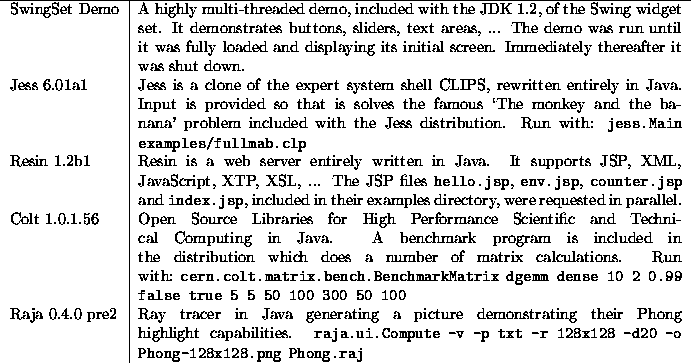
A number of general tools have already been developed to automatically detect data races in a program. Eraser![]() , for example verifies the locking discipline [19]. If a memory location is read/written by different threads, a set of locks must be held. Each time this location is accessed again, the tool checks which locks are held and whether their use is consistent with previous use. Another tool for checking, among others, for data races is RecPlay [17]. It takes a different approach from Eraser's since it performs data race detection off-line, using a recorded trace from a previous execution. The types of races detected are similar to our definition given above.
, for example verifies the locking discipline [19]. If a memory location is read/written by different threads, a set of locks must be held. Each time this location is accessed again, the tool checks which locks are held and whether their use is consistent with previous use. Another tool for checking, among others, for data races is RecPlay [17]. It takes a different approach from Eraser's since it performs data race detection off-line, using a recorded trace from a previous execution. The types of races detected are similar to our definition given above.
Both these tools function `blindly', not knowing what type of program they are analyzing, and observe the stream of processor instructions that are being executed and the memory locations upon which they operate. In contrast, true Java specific tools also exist.
JProbe is a tool capable to detect, among other things, data races [9] in Java programs. It seems to be using Sun's Java Virtual Machine Profiler Interface (JVMPI). This is an interface that allows profilers to request to be notified of certain events in a Java program such as the loading of classes, start of garbage collection, entering of monitors, etc. Although nothing is published about its internal workings, except its user manual, it seems to use a similar definition of data races as the one used by TRaDe.
Another Java tool is AssureJ [10]. It is also capable of data race detection, among other things, and is very fast. Nothing is known about the algorithm it uses. It does not seem to use the JVMPI but rather to be a modified Sun 1.2 JVM. Again, it seems to use a similar definition of a race as used in TRaDe. One important short-coming that was noticed is that when two events race (so their vector clocks are parallel) but their threads do not actually overlap in time, no race is detected.![]() This is probably due to the fact that they remove all information concerning the behaviour of a thread as soon as it terminates, which is incorrect.
This is probably due to the fact that they remove all information concerning the behaviour of a thread as soon as it terminates, which is incorrect.
We've run extensive benchmarks comparing TRaDe to JProbe and AssureJ. See Table 1 for a description of the benchmark programs and options used. We selected large applications from a wide variety of problem domains.

Table 1: Description of benchmark programs
The options used for each race detection tool are configured so that each has to find races in the whole of the program. Both JProbe and AssureJ have options to focus their race detection on certain sections of the code. These options were turned off. All programs have the ability to detect races on arrays as a whole, called `collapsing' arrays, or to consider the elements of an array as separate entities which each can be involved in a race. We chose to collapse arrays to conserve memory since this is the recommended setting for JProbe and AssureJ. Each was configured so as to enable their best performance. All other features were turned off.
The results can be seen in Table 2. All benchmarks were run on a Sun Ultra 5 workstation with 512 MB of memory and a 333 MHz UltraSPARC IIi with a 16 KB L1 cache and a 2MB L2 cache. Memory usage and user time were estimated by averaging 5 measurements with no other user programs running. Some benchmarks could not be run in 512 MB of memory. A larger system was then used as an indication of how much more resources are needed to complete the benchmark. In this case, a Sun Ultra-2 was used with 2048 MB of memory, 4X400 Mhz UltraSPARC IIi processors with 16 KB L1 direct mapped cache and 4MB L2 direct mapped cache each. Note that we were unable to use this machine exclusively. Other user programs were running simultaneously.
We also added some baseline measurements for comparison with normal execution without race detection. Figures using the Hotspot 1.0.1, mixed mode, build f were added. This is a state of the art just-in-time (JIT) compiler from Sun which compiles Java code to native code where necessary. Since we are not using the JIT included in the Sun JVM, we also added baseline figures using only the interpreter version of the JVM.

Table 2: Performance measurements
As can be seen, TRaDe is faster on all benchmarks than JProbe and AssureJ. It beats JProbe by a very large margin; many benchmarks cannot be completed due to memory exhaustion. When averaged out, TRaDe is a factor 1.6 faster than AssureJ. As to memory consumption, TRaDe again beats JProbe by a very large margin.
AssureJ is more on par with TRaDe in the area of memory consumption. AssureJ, on average, uses only a factor 0.74 of the memory TRaDe uses. This may be caused by the fact that AssureJ incorrectly removes information about dead threads but until they divulge their algorithm, it is anybody's guess.